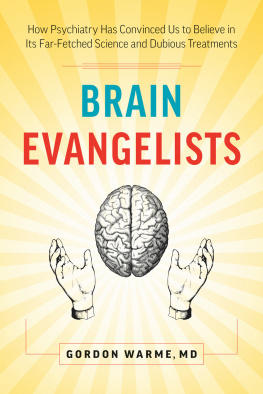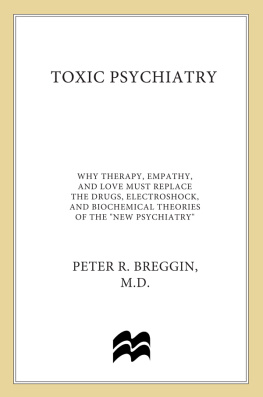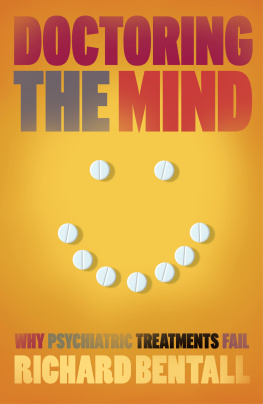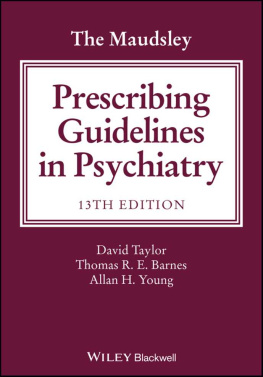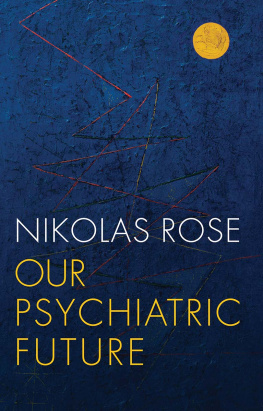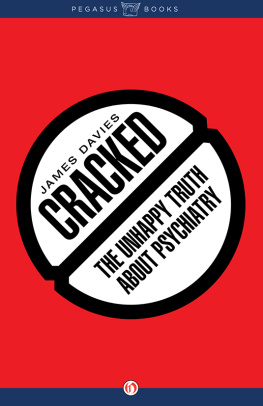1
A Helping Hand, a Pill or Two, and Thoughtfulness
If youre going through hell, keep going.
WINSTON CHURCHILL
I N 1943 , MY Aunt Dona was having trouble. She complained that other passengers on streetcars were staring at her, and at her work place, everyone criticized her. She decided that a streetcar conductor was gossiping about her, and she made a scene bad enough that he had to stop his trolley and shoo her out onto the street. She spent a lot of time at our house, most of the time arguing and accusing. One day, Dr. Broad, our family doctor, was making a house call because someone was sick, so my mother told him about Donas troubles. Well, he said. She needs a break. Doesnt she have a sister in Halifax shes close to? Tell her I said shes to take a couple of weeks off work and go to stay with her sister. We all knew that Dona and her sister Rosie often argued, but Dona nevertheless went. After two weeks of bickering with her sister, she came back to Toronto, her suspicious paranoia gone.
Dr. Broad was wily and experienced.
MANY WHO COME to hospitals are not fully mad. They get better, some quickly, cured by pills, talk, or other medical magicby drugs that really work, and by an array of symbolic interventions. Sometimes their stories are benign, with happy endings, but others are unchangeable tragedies. If questioned closely, all patients have stories that are dramatic and complicated, even if the urgent clinic is too busy for anyone to flush out the details; mostly, theres no time to storm the citadel or to re-dream someones life. About her way of working with these patients, my ideal psychiatrist admits the truth: she has ready at hand a set of gestures shes become skilled at using and can tailor to suit a particular patient. She wishes she had time to discover and discuss the unique life story of every person who comes to the clinic, but she hasnt. On the front line, the psychiatrist relies mostly on relationship cures and placebo cures, the cures promised by psychiatrists and that give people hope. Briefly and temporarily, to get them through a rough patch, she also gives drugs.
All psychiatrists ought to spend time working with urgent cases. Not only that, we talking doctors ought to see more deeply disturbed patients in our own offices, brushing up on how to use the drugs that, even though overused, are sometimes necessary to give short-term relief. Just like everyone else, we deceive ourselves with excuses for why we sit in our offices seeing only more culturally adroit patients, those well enough to search out fancy doctors (me, for example), those interested in soul-searching and serious talk. We humans are stubbornly ourselves, determined to pursue our well-established ways. Changing human behaviour, social systems, and cultural institutions is a forbidding project, so a stubborn, counter-determination is necessary, a resolve or will to do things differentlywhile remaining calm. I was at a bullfight here in Mexico City yesterday and came away with the idea that I am calm like a matador who, grim-faced, makes passionate love with his bull, to whom he ardently calls out, Toro! Toro bravo!
Most patients, those with mental aches, common wounds, fears, and silliness, reward the psychiatrist with praise and testimonials no matter what she doesall it takes is a pill or two, a bit of talk with a confident doctor. If the patient feels better, his gratitude is justified, but since everyday life is more scripted than we think, that gratitude is also archetypallike most of us, the patient has been brought up to be grateful and admiring of his doctor, and that gratitude, often intense, ought to be one of the things the psychiatrist is suspicious of. Instead, her patients praise leads the psychiatrist into temptation, lures her into thinking she may be a wizard, that she is special; she risks forgetting that she is a cultural institution, that awe and admiration of the doctor/guru figure is part of every culture. She must remind herself that she has other patients, the envious, greedy, and paranoid, pessimists and whiners who scorn her and her ilk and are resistant, baffling, and ungrateful. Because she doesnt cure them, these patients wreck everything. She is therefore tempted to reassign them to a category that fits with certain bad psychiatric habits, to label them unsuitable, resistant, or noncompliant.
What follows are three case histories, stories from the lives of three people: one from the emergency department (Georges Valois), one from the outpatient clinic (Jake Andrews), and one from my private practice (Janice Brittain). My intent is to familiarize you with the shape of a psychiatrists day, what she struggles with, and how she deals with the problems that come her way. You will notice that only with the second case is there serious psychiatric talk. With the first and third cases, the task was simply to get someone through a rough patch.
Georges Valois : The police brought Mr. Valois, cursing and struggling, to the emergency department in restraints. The staff tried to reassure him that he would be all right, but when they released him, he struck out at whoever was closest. His face was purple with rage, his veins stood out as he struggled, and he spat at anyone who talked to him. He had been brought from a fitness club, where he had attacked a spinning instructor. The staff of the club told the police that Mr. Valois was a regular at spinning classes, but the instructor had recently noticed him muttering under his breath during the classes. That day, partway through the class, the instructor had spoken to him. Are you okay, Georges?
Mr. Valois didnt answer. He put his head down and pedalled harder, not looking up for the remainder of the class. When the class was over, he waited until everyone had left and then spoke angrily to the instructor: Why did you ask me how I was? Why did you single me out? What kind of a patronizing asshole are you? The instructor explained that he liked him and was worried about him.
You fucking prick. See, youre doing it again, thinking theres something wrong with me. And when the instructor tried to reassure him further, Mr. Valois shoved him hard, and they fought. Several club members helped hold Mr. Valois down, the police were called, and because he seemed incoherent and confused, he was brought to the hospital. The staff noticed that when they tried to reassure him, he responded just as he had at the fitness club: he became even more furious. Against his will, Mr. Valois was injected with the drug haloperidol. After half an hour, no calmer, he was given another injection of the same drug. Although calmer, later that evening Mr. Valois still seemed confused, but agreed to be admitted to the hospitals short-term care unit.
The next day, he explained that although he had never before been physically aggressive, he had a temper. Because he was sure that he was by then okay, and with the agreement of the doctor, he went home with a three-day prescription for lorazepam and an appointment to see the doctor a week later. At that appointment, he expressed regret for the trouble he had caused, explaining that he had written an apology to the spinning instructor, and that, as someone on the psychiatric unit had suggested, he would think about attending anger management classes. The doctor wasnt sure whether Mr. Valois was telling the truth.
Im unpopular if I insist that removing someones civil rights is a moral decision, not a medical onebut it is, and only the law should legislate morality. A psychiatrist is in flawed moral territory if she thinks a person should be detained because he upsets his family, friends, doctors, or the police. If my wife upsets me, should she be locked up against her will? What if she screams at me? Throws dishes? And me... should I be locked up if I punch a hole in the wall, shout at my wife, and call her a bitch in front of my children? In the clinic, the psychiatrist should confine herself to calming the patient, not according to a protocol, a manual, or formal criteria, but using common sensethe common sense thats always liable to misfire, yet it is the only thing weve got to go by. Any actions beyond immediate and urgent comfortingwith drugs or with wordsshould not be allowed, certainly nothing that would allow the psychiatrist to confine someone like Mr. Valois against his will. Despite my smug confidence that thered be no problem were it me (the all-knowing and always sensible me) making these decisions, its wrong that, because Im a psychiatrist, the law has given me that power.

